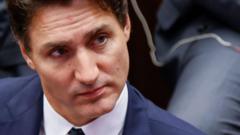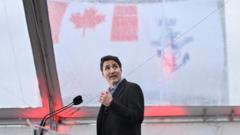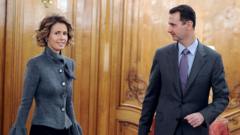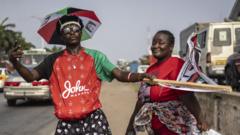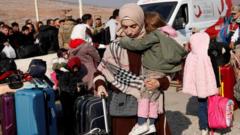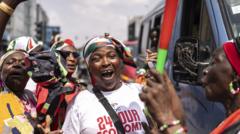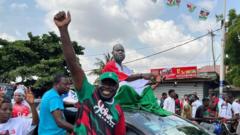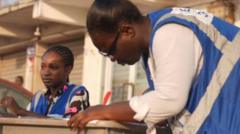As Ghana approaches presidential elections amid an economic crisis, Nathaniel Qainoo, a 29-year-old mechanic, reflects on the challenges faced by the youth. The insights reveal the stark reality of Ghana's economy and the contrasting approaches of the leading candidates, with former President Mahama seeking to reclaim power and Vice President Bawumia aiming to usher in a new digital economy.
Voices from Ghana's Economic Hardship: An Accountant's Transition and the Upcoming Elections
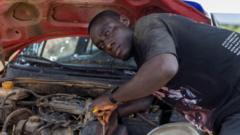
Voices from Ghana's Economic Hardship: An Accountant's Transition and the Upcoming Elections
In a small town in Ghana, Nathaniel Qainoo, a former accountant, shares his views on the country's dire economic situation and how it influences the election.
When the BBC met Nathaniel Qainoo, a 29-year-old from Kasoa, Ghana, he was swapping his calculator for a spanner, embodying the struggles faced by many young Ghanaians. After graduating as an accountant five years ago, Qainoo found himself without a job, forced to embrace mechanics as a means of survival amid a worsening economic crisis. This situation reflects a broader sentiment of despair that has permeated Ghana since 2022, characterized by crippling inflation and a steep depreciation of the national currency, the cedi.
Ghana's economic woes escalated dramatically when the government defaulted on debt repayments and international agencies downgraded the nation's credit rating. By 2023, inflation soared to an alarming 54%, pushing the government to seek a $3bn bailout from the International Monetary Fund (IMF). Qainoo expressed his dismay, stating, "I don't know how this country is going to be saved from this crisis." The alarming economic landscape has disillusioned many, particularly the youth, prompting some to contemplate emigration to western countries in search of better opportunities.
As Ghanaians gear up to vote for their next president on Saturday, two main candidates dominate the political scene: John Mahama, a former president, and Mahamudu Bawumia, the current vice president. Mahama is attempting a comeback after losing the presidency in 2017, while Bawumia aims to break the cycle of political history that has prevented any party from securing more than two consecutive terms since 1992. Each candidate's vision for economic recovery underscores the election's central theme, reflecting the populace's urgent needs.
Bawumia's campaign, despite being marred by economic mismanagement during his tenure, seeks to project him as a champion of a "digital economy" aimed at creating jobs for the youth. His strategy focuses on equipping one million young people with relevant skills and establishing a regulatory environment to support tech entrepreneurs. Conversely, Mahama's platform proposes a "reset" of the economy while advocating for a 24-hour job market—a concept that has gained traction in various global economies.
Both candidates are aware that addressing the cost of living crisis is essential. Their campaigns feature promises to repeal burdensome taxes and secure the future economic well-being of citizens, a challenging issue given the fiscal limits imposed by their involvement in the IMF recovery program. Political analysts suggest this could result in a contentious race; however, recent polls favor Mahama by a slim margin, reflecting a political climate rife with skepticism and a call for accountability from both candidates. As they traverse the campaign trail, the disenchanted voices of young Ghanaians like Qainoo resonate, reminding the candidates of the pressing need for responsive leadership that prioritizes genuine solutions to the ongoing economic challenges.

